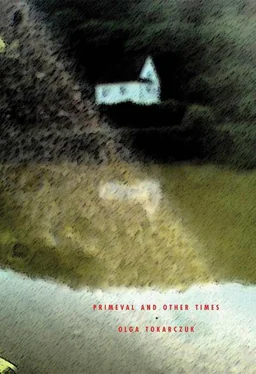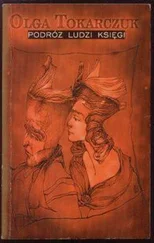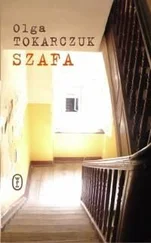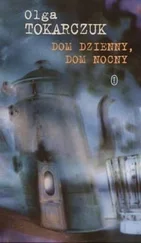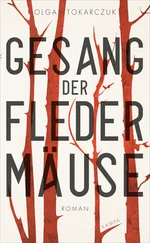Florentynka sighed.
“I’m going to pray to your husband, and you mind my dog.”
She tied the dog to the railing in front of the miraculous icon, among the baskets, over which crocheted napkins had been thrown.
“I’ll be back in a moment.”
She found herself a place in the front row among the dressed-up women from Jeszkotle. They moved away from her a little and glanced at each other knowingly.
Meanwhile the sacristan, who was meant to keep order in the church, went up to the side altar of the Virgin Mary of Jeszkotle. First he noticed something moving, but for some time his eyes could not make sense of what they were seeing. When he realised that a hideous great mangy dog had just been rummaging around in the baskets full of food to be blessed, he staggered in indignation and the blood rushed to his face. Horrified by this sacrilege, he leaped forward to drive away the impudent animal. He grabbed the string, and with hands trembling in dismay, undid the knot. Just then he heard a quiet woman’s voice coming from the icon:
“Leave that dog alone! I’m minding him for Florentynka from Primeval.”
The foundations were dug in a perfect square. Its sides corresponded to the four points of the compass.
First Michał, Paweł Boski and the workmen built the walls out of stone – that was the underpinning – and then out of wooden beams.
Once they had enclosed the cellars, they started talking about the place as a “house,” but only once they had built the roof and crowned it with a garland did it become a house for good and proper. For a house starts to exist as soon as its walls enclose a bit of space within them. It is this enclosed space that is the soul of the house.
They spent two years building the house. They hoisted the garland onto the roof in the summer of 1936. They took a photo of themselves in front of the house.
The house had several cellars. One of them had two windows, and this one was meant to be the basement and the summer kitchen in one. The next cellar had one window – they designated it the closet, laundry, and potato store. The third one had no windows at all – this was to be a storage space in case of need. Under this third one Michał ordered another, fourth little cellar to be dug, small and cold – for ice and goodness knows what else.
The ground floor was high, on stone underpinnings. The way into the ground floor was up steps with a wooden balustrade. There were two entrances. One was from the road, via the porch straight into a large hallway, which led into the rooms. The second entrance led through a vestibule into the kitchen. The kitchen had a large window, and against the wall opposite stood the kitchen stove made of sky-blue tiles that Misia chose in Taszów. The stove was finished with brass fittings and rails. There were three doors in the kitchen: into the biggest room, under the stairs, and into a small room. The ground floor was a ring of rooms. If you opened all the doors, you could walk around it in a circle.
From the hallway a staircase led up to the first floor, where the next four rooms were waiting to be finished.
Above all this there was yet another storey – the loft, which was reached via some narrow, wooden stairs. The loft fascinated little Izydor, because it had windows looking in all four directions.
The outside of the house was covered in boards laid like fish scales. This was old Boski’s idea. Old Boski also laid the roof, just as beautiful as the manor house roof. In front of the house there was a lilac tree. It was already growing there before the house existed. Now it was reflected in the windowpanes. A bench was placed under the lilac. People from Primeval stopped there to admire the house. No one in the area had ever built such a fine house before. Squire Popielski also came on horseback and clapped Paweł Boski on the shoulder. Paweł invited him to the wedding.
On Sunday Michał went to fetch the parish priest to come and bless the house. The priest stood on the porch and looked around approvingly.
“What a beautiful house you have built for your daughter,” he said.
Michał shrugged.
Finally they began to bring in the furniture. Old Boski made most of it, but there were also pieces brought by horse and cart from Kielce, such as a large grandfather clock, a dresser for the living room, and a round oak table with carved legs.
Misia’s eyes grew sad when she looked at the house’s surroundings – flat, grey earth covered in dry grass of the kind that grows on fallow ground. So Michał bought a lot of trees for Misia. And in the course of a single day around the house he established something that would one day be an orchard, with apple trees, pears, plums, and walnuts. At the very centre of the orchard he planted twin rennet apples, the tree that grows the fruit that tempted Eve.
Stasia Boska lived alone with her father after her mother’s death, and after her sisters had gone to live with their husbands and Paweł had married Misia.
It was hard living with old Boski. He was always dissatisfied and quick tempered. Sometimes he thrashed her with something heavy if she was late with his dinner. Then Stasia would go among the currants, crouch among the bushes and cry. She tried to cry quietly, to avoid enraging her father even more.
When Boski found out from his son that Michał Niebieski had bought land to build a house for his daughter, he couldn’t sleep. A few days later he scraped together all his savings and bought some land too, right next to Michał’s.
He decided to build a house there for Stasia. He spent a long time thinking about it, as he sat on the manor house roof. “If Michał Niebieski can put up a house for his daughter, why can’t I, Boski, do the same?” he reflected. “Why shouldn’t I build a house, too?”
And Boski started building a house.
He marked out a rectangle on the ground with a stick, and next day began to dig the foundations. Squire Popielski gave him a holiday. It was the first holiday old Boski had ever had. Then Boski fetched large and smaller rocks from the neighbourhood, white chunks of limestone that he arranged evenly in the excavated pits. It took a month. Paweł came to see Boski and lamented over the excavated pits.
“What are you doing, Papa? Where will you get the money? Don’t make a fool of yourself by building some henhouse under my nose.”
“Big-headed already, are you? I’m building your sister a house.”
Paweł knew there was no way of convincing his father, so finally he fetched the planks for him by horse and cart.
Now the houses were rising almost in parallel. One was big and shapely, with large windows and spacious rooms. The other was small, pressed to the ground, hunched, with tiny windows. One stood on an open space, with the forest and River behind it. The other was wedged in between the Highway and the Wola Road, hidden in the currant bushes and wild lilac.
While Boski was busy building the house, Stasia had more peace. By noon she had to feed the animals, and then she got down to making the dinner. First she went to the field, and from the sandy earth she dug up some potatoes. She dreamed she might find treasure under the bushes, jewels wrapped in a rag or a tin full of dollars. Later on as she peeled the small potatoes, she would imagine she was a healer, the potatoes were the sick people who had come to her, and she was removing their illness and cleansing their bodies of all foul matter. Then as she tossed the peeled potatoes into the boiling water she would imagine she was brewing an elixir of beauty, and as soon as she drank it, her life would change once and for all. Some doctor or lawyer from Kielce would see her on the Highway, shower her in gifts and fall in love with her like a princess.
Читать дальше
